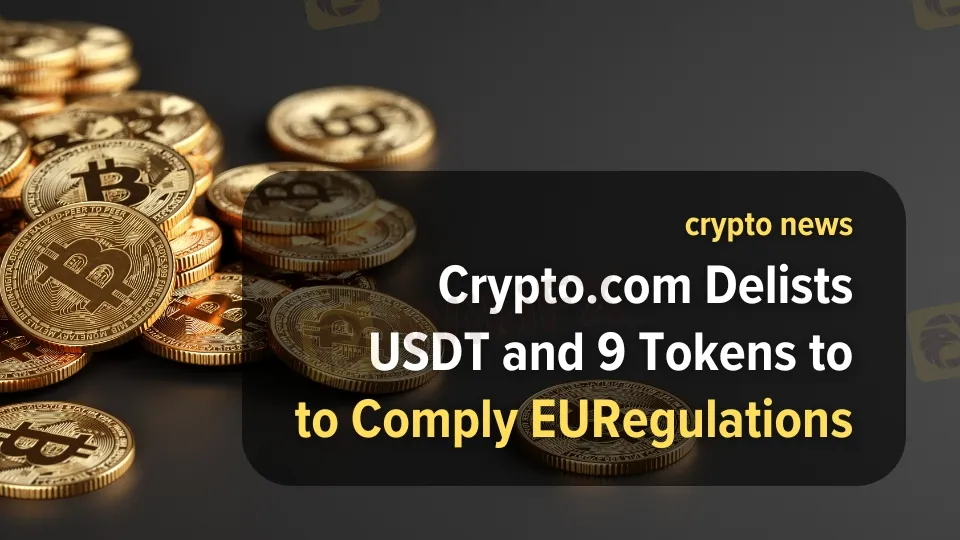Crypto.com Delists USDT and 9 Tokens to Comply with MiCA Regulations
Abstract:Crypto.com delists USDT and 9 tokens to comply with MiCA regulations. Users must withdraw assets by March 31. Learn more about MiCA’s impact on stablecoins.

Crypto.com is making big changes to follow Europe‘s new crypto regulations. By January 31, 2024, the exchange will delist Tether’s USDT stablecoin and nine other tokens, including Wrapped Bitcoin (WBTC), DAI, Pax Dollar (USDP), PayPal USD (PYUSD), Staked ETH (stETH), Staked SOL (stSOL), Liquid Cronos (LCRO), and XSGD. Users will have until March 31 to withdraw these assets. After that, any remaining tokens will be automatically converted to a stablecoin or asset that complies with Europes Markets in Crypto-Assets (MiCA) rules.
MiCA is a set of strict regulations designed to bring more transparency and safety to the crypto industry in the European Economic Area (EEA). One of its key requirements is that stablecoins, like USDT, must hold enough reserves to back their value. While this aims to protect consumers, it has created challenges for USDT, the world‘s largest stablecoin. Tether’s CEO, Paolo Ardoino, has expressed concerns that these rules could create risks for both banks and the crypto market. Still, Tether is working on solutions, backing projects like Quantoz and StablR, which are developing euro-based stablecoins that meet MiCAs standards.

Crypto.coms decision comes after it received full approval under MiCA on January 27. The Malta Financial Services Authority (MFSA) granted the exchange a license, making it one of the first platforms authorized to operate across the EEA under the new rules. This approval allows Crypto.com to offer regulated crypto services in Europe, giving users more confidence in its operations. By delisting USDT and other tokens, the exchange is showing its commitment to playing by the rules as Europe tightens its grip on the crypto industry.
This move highlights how MiCA is reshaping the crypto landscape, especially for stablecoins like USDT. As regulations evolve, exchanges and crypto businesses must adapt, even if it means letting go of popular assets. For users, this means more security but also changes to how they manage their crypto. As the industry grows, finding a balance between innovation and regulation remains a key challenge, and Crypto.coms latest steps are a clear sign of this shift.

Read more

US Crypto Fraud Losses Jump 66% in 2024, Reaching Alarming Highs
Crypto-related scams cost U.S. investors $9.3 billion in 2024, marking a 66% surge from the previous year, with seniors and fake investment schemes among the hardest hit.

World Trading Tournament (WTT): The Game-Changer in Global Trading
The World Trading Tournament (WTT) is not just a competition — it’s a global movement reshaping the trading world. With a bold vision to turn trading into a competitive sport, WTT offers a platform where skill, strategy, and technology collide in electrifying fashion.

Why You Shouldn't Be Afraid to Trust Your Capital to Regulated Brokers
Discover why regulated brokers offer safety for your capital with oversight, security, and transparency, plus the risks of unregulated options. Invest with confidence.

UN Warns Asian Scam Operations are Spreading Worldwide
UN report reveals Asian scam operations expanding globally, targeting Africa, Latin America with cyberfraud, generating billions amid crackdowns.
WikiFX Broker
Latest News
Coinbase Eyes U.S. Federal Bank Charter for Crypto Growth
Why People Fall for Online Trading Scams
Germany’s April PMI Falls Below 50 as Service Sector Stumbles
PayPal Opens Regional Hub in Dubai, Expands Middle East Reach
FINRA fines SpeedRoute for alleged rule violations
RM15,000 Profit Turned into RM1.1 Million Loss for Engineer!
New to FX Trading? Stop! Read These Warnings First
Prop Trading Firms vs. CFD Brokers: Who’s Winning the Retail Trading Race?
TRADE.com UK Sold to NAGA Group Amid 2024 Revenue Drop
World Trading Tournament (WTT): The Game-Changer in Global Trading
Rate Calc
